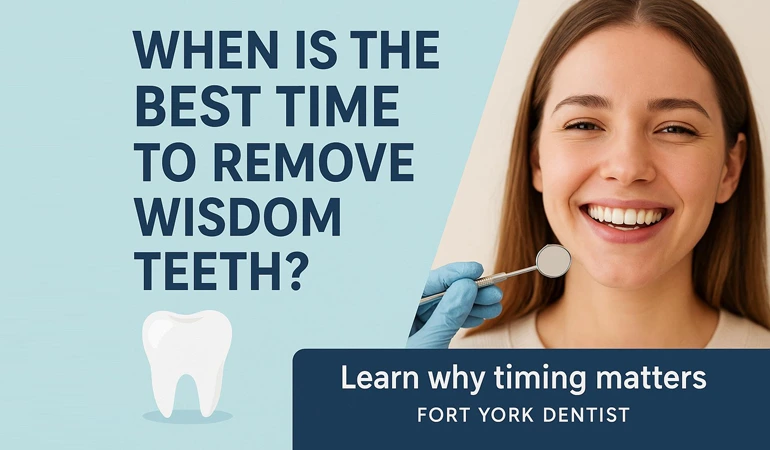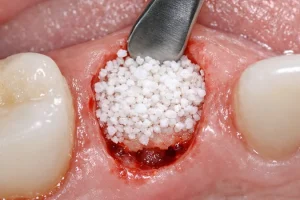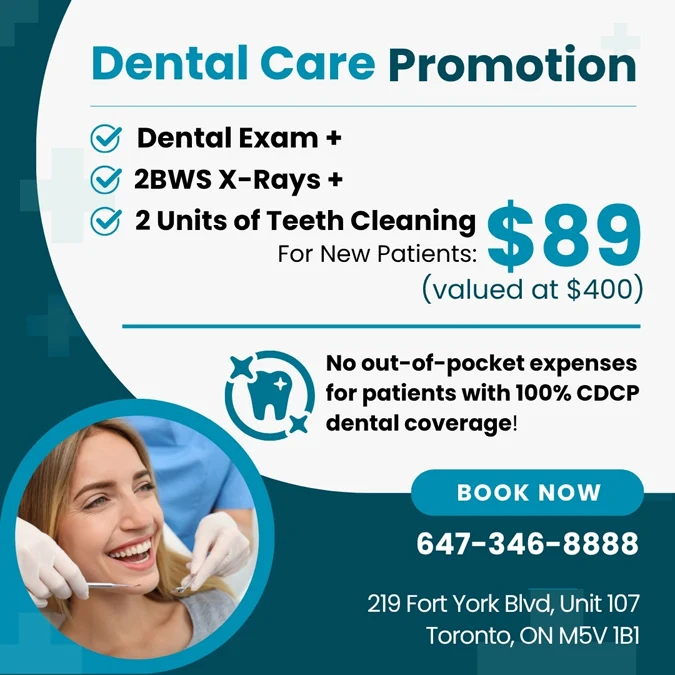When Is the Best Time to Remove Wisdom Teeth?

When Is the Best Time to Remove Wisdom Teeth?
Wisdom teeth—also called third molars—are the last set of permanent teeth to appear, typically erupting between the ages of 17 and 25. While some people have enough space for these teeth to grow in properly, many experience problems such as pain, swelling, or crowding. In some cases, wisdom teeth can become impacted, meaning they remain trapped under the gum or bone, which can lead to infection or damage to neighbouring teeth.
At Fort York Dentist, we often get asked whether wisdom teeth really need to be removed and, if so, when is the best time to do it. The short answer? The earlier they’re evaluated, the better your chances of avoiding complications.
Why Timing Matters
The timing for wisdom tooth removal is important for several reasons:
1. Younger age, easier recovery
Patients in their late teens or early twenties tend to heal faster after surgery. This is because the roots of the wisdom teeth are not yet fully developed, and the surrounding bone is softer. This makes the extraction less complex and the healing period shorter.
2. Preventing problems before they start
Wisdom teeth often cause problems before they are even visible in the mouth. Early evaluation—usually in the late teens—allows the dentist to identify potential issues such as impaction, cyst formation, or crowding, and address them before they worsen.
3. Avoiding bone hardening and nerve complications
As we age, wisdom teeth roots grow longer and often settle closer to important structures—especially the inferior alveolar nerve in the lower jaw and the sinus cavity in the upper jaw. This can make extractions more complex and increase the risk of nerve injury.
Multiple studies show that patients in their late teens or early twenties have a much lower risk of nerve damage because the roots are not yet fully formed and the surrounding bone is softer and more flexible. For example, research published in the Journal of Oral and Maxillofacial Surgery found that complications like nerve injury and delayed healing were significantly more common in patients over 25 compared to younger patients.
In simpler terms: removing wisdom teeth earlier often means an easier procedure, quicker healing, and fewer complications down the road.
Signs It’s Time to Remove Wisdom Teeth
While not everyone needs their wisdom teeth removed, you should consult a dentist if you experience:
- Pain or pressure in the back of the mouth
- Red, swollen, or bleeding gums around the molars
- Jaw stiffness or swelling
- Bad breath or an unpleasant taste in the mouth
- Crowding of other teeth
- Repeated infections in the gum around the wisdom tooth
Even without these symptoms, your dentist may recommend removal if your X-rays show that the wisdom teeth are likely to cause problems in the future.
The Ideal Age for Wisdom Tooth Removal
For most patients, the late teenage years to early twenties are the optimal time for extraction. This is when the wisdom teeth have developed enough to be removed but before the roots have fully formed.
At Fort York Dentist, we typically recommend evaluating wisdom teeth around ages 16 to 19. That doesn’t mean every patient will need surgery immediately, but regular monitoring allows us to choose the best timing based on your unique situation.
What to Expect During the Procedure
Wisdom tooth extraction is a common outpatient procedure performed under local anesthesia, sedation, or general anesthesia depending on the case and patient preference. Our team focuses on comfort and efficiency, using modern techniques to minimize discomfort and speed up recovery.
Recovery and Aftercare
Most patients recover within 5–7 days, although complete healing of the gums and bone may take a few weeks. You can help your healing process by:
- Following your dentist’s post-operative instructions carefully
- Applying ice packs to reduce swelling in the first 24 hours
- Eating soft foods and avoiding hot, spicy, or hard foods
- Keeping your mouth clean with gentle rinsing after the first day
- Avoiding smoking or drinking through a straw, which can cause dry socket
Frequently Asked Questions (FAQ)
- Do all wisdom teeth need to be removed?
No. If your wisdom teeth are healthy, fully erupted, properly aligned, and easy to clean, you may not need them removed. Regular dental check-ups and X-rays help determine whether extraction is necessary. - What happens if I don’t remove impacted wisdom teeth?
Impacted wisdom teeth can lead to infections, cysts, damage to neighbouring teeth, gum disease, and even bone loss. Leaving them untreated can make future extractions more difficult and increase the risk of complications. - Can I remove all four wisdom teeth at once?
Yes. Many patients choose to have all four removed in one appointment for convenience. This allows you to go through the healing process just once instead of multiple times. - How painful is wisdom tooth removal?
During the procedure, anesthesia prevents you from feeling pain. Mild discomfort and swelling after the surgery are normal, but these symptoms usually improve within a few days. Over-the-counter or prescribed pain relievers can help manage post-operative discomfort. - What is dry socket, and how can I avoid it?
Dry socket occurs when the blood clot that forms after extraction becomes dislodged, exposing the bone and nerves. It can cause significant pain and delay healing. To prevent it, follow aftercare instructions closely, avoid smoking, and don’t use straws for at least a week. - Can older adults have wisdom teeth removed?
Yes, but recovery may take longer and the risk of complications is slightly higher due to denser bone and fully developed roots. A careful assessment is essential before surgery in older patients.
Final Thoughts
Wisdom teeth removal isn’t always urgent, but the best outcomes come from early evaluation and timely action. If you or your teen are approaching the late teen years, now is the time to schedule an assessment. Even if you’re an adult experiencing discomfort or dental crowding, it’s never too late to discuss your options.
At Fort York Dentist, our goal is to make your experience as comfortable as possible while ensuring long-term oral health. Contact us today to book your wisdom tooth consultation and take the first step toward a healthier, pain-free smile.









